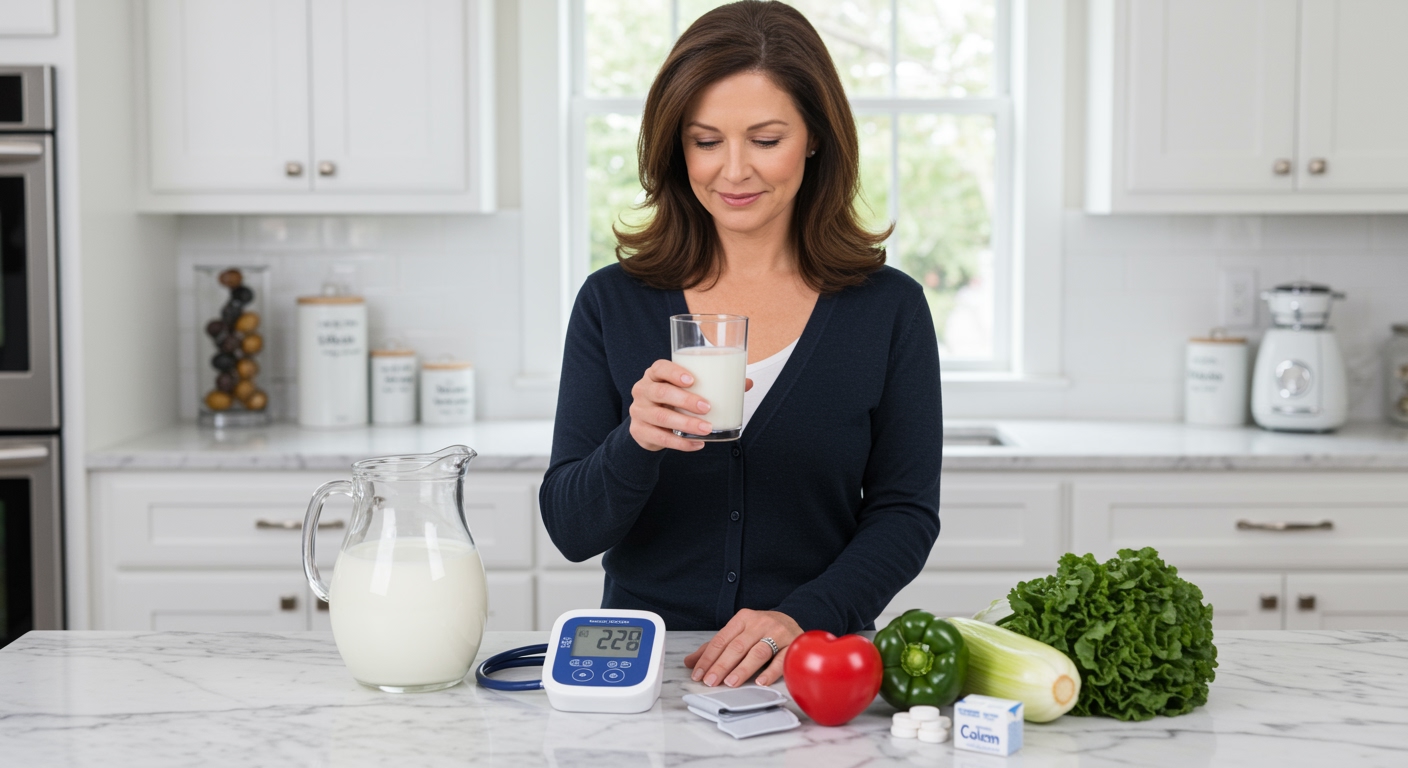✪ Key Takeaway: Regular milk consumption can help lower blood pressure through calcium, potassium, and bioactive peptides that support heart health.
Introduction
Your doctor just told you that your blood pressure is too high, and now you are wondering about every food and drink in your kitchen.
You might be asking this question because you have heard conflicting information about milk and heart health, or perhaps someone told you that dairy products raise blood pressure.
Hi, I am Abdur, your nutrition coach, and today I am going to explain exactly how milk affects your blood pressure and what the latest research reveals about this common beverage.
What Does Science Say About Milk and Blood Pressure?
Multiple large-scale studies show that people who drink milk regularly have lower blood pressure compared to those who avoid dairy products.
A comprehensive analysis of over 45,000 people found that those consuming three servings of low-fat dairy daily had a 13% lower risk of developing high blood pressure.
The DASH diet, which doctors recommend for blood pressure control, specifically includes 2-3 servings of low-fat dairy products as a core component.
Research from Harvard Medical School followed 28,000 women for 10 years and discovered that those drinking skim milk had significantly lower systolic blood pressure readings.
The evidence consistently points in one direction: milk consumption is associated with better cardiovascular health when consumed as part of a balanced diet.
✪ Fact: The DASH diet includes dairy products because they provide three key nutrients that naturally lower blood pressure.
How Does Milk Lower Blood Pressure?
Milk contains calcium, which helps your blood vessels relax and contract properly, leading to smoother blood flow throughout your body.
The potassium in milk works like a natural diuretic, helping your kidneys remove excess sodium that can raise blood pressure.
Milk proteins break down into bioactive peptides during digestion, and these compounds act similarly to ACE inhibitor medications by relaxing blood vessels.
The magnesium content supports proper muscle function in your heart and blood vessels, contributing to steady blood pressure levels.
These nutrients work together synergistically, meaning their combined effect is stronger than each nutrient working alone.
Your body absorbs these blood pressure-lowering compounds more effectively when they come from whole foods like milk rather than isolated supplements.
✪ Pro Tip: Drink milk with meals to maximize nutrient absorption and blood pressure benefits.
Which Type of Milk Works Best?
Low-fat milk and skim milk show the strongest blood pressure benefits in research studies compared to whole milk.
The reason is simple: you get all the beneficial nutrients without the saturated fat that can negatively impact cardiovascular health.
Whole milk contains about 5 grams of saturated fat per cup, while skim milk has virtually none while maintaining the same calcium and protein content.
Plant-based milk alternatives like almond or oat milk do not provide the same blood pressure benefits because they lack the specific bioactive compounds found in dairy milk.
However, fortified plant milks can still contribute calcium and other nutrients, though the bioavailability may differ from natural dairy sources.
If you choose plant alternatives, look for unsweetened versions fortified with calcium, vitamin D, and protein to maximize potential benefits.
✪ Note: One cup of low-fat milk provides about 30% of your daily calcium needs for blood pressure support.
How Much Milk Should You Drink?
Most research suggests 2-3 servings of low-fat dairy per day for optimal blood pressure benefits, with one serving being 8 ounces of milk.
This amount provides approximately 600-900 mg of calcium, which falls within the recommended daily intake for cardiovascular health.
You can spread these servings throughout the day: one glass with breakfast, another with lunch, and perhaps some in your evening cereal or smoothie.
More is not necessarily better, as excessive dairy consumption may lead to other health concerns and does not provide additional blood pressure benefits.
If you are lactose intolerant, lactose-free milk provides the same nutrients and cardiovascular benefits as regular milk.
Remember that other dairy products like yogurt and cheese also count toward your daily intake and provide similar blood pressure-supporting nutrients.
✪ Pro Tip: Track your dairy intake for one week to see if you are meeting the recommended 2-3 servings daily.
Are There Any Concerns About Milk and Blood Pressure?
Some people worry about the sodium content in milk, but one cup contains only about 100 mg, which is relatively low compared to processed foods.
The potassium-to-sodium ratio in milk actually favors blood pressure reduction, as potassium helps counteract sodium effects on blood pressure.
If you have kidney disease, you should consult your doctor about dairy consumption because your body may have difficulty processing excess calcium and phosphorus.
People taking certain blood pressure medications should discuss dairy intake with their healthcare provider, as calcium can interact with some drugs.
The key is moderation and choosing low-fat options to maximize benefits while minimizing potential risks from saturated fat.
Always consider milk as part of your overall dietary pattern rather than expecting it to single-handedly control your blood pressure levels.
✪ Note: Milk works best for blood pressure when combined with other heart-healthy foods like fruits and vegetables.
The Bottom Line
The scientific evidence clearly shows that regular consumption of low-fat milk can help lower blood pressure through multiple beneficial mechanisms.
Simple nutrition choices like drinking milk daily can create powerful changes in your cardiovascular health over time.
I would love to hear about your experience with milk and blood pressure, or if you have any questions about incorporating dairy into your heart-healthy eating plan, so please share your thoughts in the comments below.
References
At NutritionCrown, we use quality and credible sources to ensure our content is accurate and trustworthy. Below are the sources referenced in creating this article:
- University of Utah Healthcare: Got Milk? It May Lower Your Blood Pressure
- PubMed: Dairy Product Consumption and Blood Pressure Meta-Analysis
- PMC: Milk Consumption and Cardiovascular Risk Factors
- Nature: Dairy Intake and Hypertension Risk





